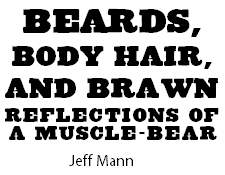 This is just an excerpt from this issue of White Crane. Subscribe today!
This is just an excerpt from this issue of White Crane. Subscribe today!
…As for animality, I remember the exact moment I realized that several physical features I find most arousing in men are simply those that make them mammals. It was the first day of a Mammalogy course in the Forestry Department I took my senior year of college. As soon as I entered the classroom, I noticed and began longing wildly after a classmate, a broad-shouldered, big-chested guy named Kevin with shaggy black hair and a full midnight-black beard. Just about the time I focused on the sight of Kevin’s nipples barely and temptingly visible through the fabric of his tight T-shirt, the professor began discussing the traits that made mammals unique. Warm blood, fur, and nipples were the ones that grabbed me; needless to say, I didn’t care about live birth. Kevin’s naked body warmth, hard and tasty nipples, black beard, and vividly imagined chest hair were already the objects of fantasy. It was then that the amateur biologist in me had this revelation: Kevin’s mammality, his animality, were what was firing me up.
Not for nothing that the bear clan is named after a wild animal, for we are simply more honest about our beast-bodies than most. As many have pointed out, furriness represents on some level our inner beast, our inner wildness so fenced in and domesticated by civilization, our Id so frequently scolded stupid by our Superego. The fur on other men and on myself reminds me of that animal, its needs, the wisdom of making peace with it, of celebrating it. Dismissing the beast is impossible. Jung pointed that out when he discussed the Shadow and the imperative need of incorporating and facing it, not banishing it. Bear sex, leather sex, rough sex are all ways of coming to terms with the odd mixture of wild and domesticated, animal and human, we all are, so it makes simple sense that what I find most sexually appealing in men is what most marks them as animals.
These observations might also help to make sense of an odd sign often posted in bear or leather bars: NO COLOGNE. Many bears I know, including myself, detest perfumes and colognes as artificial blights; the scents leap from our noses to our tongues and nauseate us. Many of us love instead the musky natural smell of a man: it’s an aphrodisiac, a true pheromone. A ripe and furry armpit becomes an erotic adventure. Biology again: what’s attracting us is animal aroma. (To me, man-musk smells like cumin. I remember once entering a friend’s kitchen, catching an arousing armpit whiff, thinking to myself, “Um, yum! Some ripe man’s in here somewhere!” only to discover that what I was randily snuffling after was a bag of cumin seeds on the kitchen counter.)
What is essential in animals is, finally, flesh and appetite. A New York City bear-chaser buddy I know recently told me that when he thought of bears, he thought of satisfied appetites. This may be because, when he visits me here in the mountains of Virginia, in what I jokingly call my B&D B&B, his hungers for good food, drink, and sex are entirely sated. (Sorry — I can’t help but boast.) Still, he has a point. If bears are honest animals, animals are honest hedonists. The animal flesh has urges; the animal satisfies those urges if circumstances permit.
This is just an excerpt from this issue of White Crane. We are a reader-supported journaland need you to subscribe to keep this conversation going. So to read more from this wonderful issue SUBSCRIBE to White Crane. Thanks!
Jeff Mann is a poet, writer and teacher. He recently won a Lambda Literary Award for his book History of Barbed Wire. White Crane interviewed Mann about his memoir/poetry collection Loving Mountains, Loving Men in issue #68. He is the author of numerous great books of poetry including On The Tongue, Bones Washed With Wine, Flintshards from Sussex and Mountain Fireflies. He teaches in the writing program at Virginia Tech.